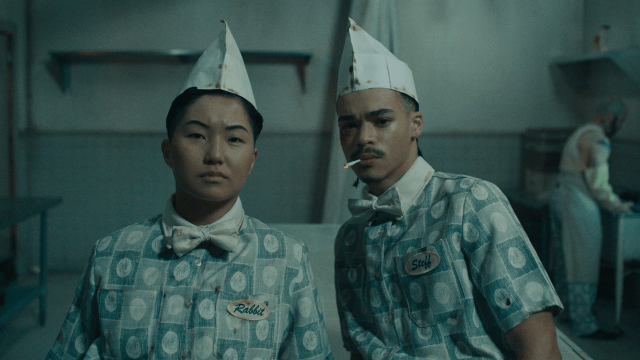‘Playland’ review: A transfixing genre-bender about Boston’s oldest gay bar where the style is the substance | Tribeca

It might just be the time of day that I’ve gone to my local gay bar, but it feels almost like a ghost town when I do. Thankfully, it has managed to stay alive. However, when watching Playland, a story about a closed gay bar that is a historical landmark, I was left a bit more apprehensive that a place that I love for its old-school charm will become a relic of the past. Not just that bar, but other ones like it which are monuments of their respective areas.
Directed by Georden West, Playland is a transfixing reminder that bars like the titular Playland Café, the oldest gay bar in Boston history that closed its doors in 1998, are more than just casual hangout spaces. They’ve served as safe havens for artistic expressions and sexual desire in the face of bigotry and anti-LGBTQ legislation. Through a series of vignettes that make up the picture’s narrative, Playland pays tribute to the various patrons that have danced their way on the bar’s floor while capturing how it’s become a literal ghost town.
When Playland begins, the ominous choir sounds heard as the camera navigates the empty building play like something out of a haunted house movie. Even the film’s characterized figures that do wander the bar, including drag queen Sunday (The Lady Bunny) and leather-clad ringleader Lady (Danielle Cooper, Pose), move around in a nearly ghost-like fashion. Their constant lack of dialogue makes them feel all the more apparitional. Although that may prove to be flustering for some viewers who want traditional exposition to get to know those we spend the movie with, West and co. find other ways to do the talking.
In what is a juxtaposition of both documentary and feature storytelling, West incorporates real-life archival footage and audio recordings used to reveal the bar’s storied history as the musical performances and small moments of patrons bonding etch out the sense of community felt within those walls. As we hear audio of bystanders condemning the bar which opened in the “Combat Zone,” an adult entertainment district in downtown Boston, for promoting sexual content, sounds of erotic moans being heard in the background and a scene of patrons casually reading Fag Rag, a radical gay-themed newspaper founded in the 1970s, act as small forms of defiance in the face of all those outcries.
Given how various politicians have proposed anti-drag club laws, it’s like we’re hearing similar outcries today as the ones those who occupied the Playland Café would often hear. Thankfully, Tennessee’s proposed anti-drag law was recently banned for being too unconstitutional. Yet, the fact that such bills are being proposed and how there’s been a record-breaking amount of proposed anti-LGBTQ laws from this year alone shows that gay bars and drag clubs are still needed as places of refuge. It also shows how spirits like the ones depicted in the film are not just lives that have passed on. They’re also walking reminders for history not to repeat itself.
A harrowing time capsule, a eulogy of a fallen landmark, and haunted house story all rolled into one, Playland is a mesmerizing aesthetic-driven gem. The fact that it pulls off various genre beats within a runtime of 72 minutes makes it even more laudable. As previously noted, its emphasis on aesthetic over performance and a traditional story arc won’t be for everyone. However, at least for this writer, it achieves what cinema is supposed to do; give the audience at least some perspective about the world around them by the time the credits roll.
Grade: A-
This review is from the 2023 Tribeca Film Festival.
- Make it a Double Feature: ‘Plainclothes’ and ‘A Nice Indian Boy’ - December 19, 2025
- Make It a Double Feature: ‘Pulse (Kairo)’ and ‘Red Rooms’ - October 22, 2025
- ‘Sk+te’kmujue’katik (At the Place of Ghosts)’ Review: A Narratively Ambitious Genre-Bending Tale of Familial Trauma [B] TIFF - September 13, 2025

 53rd Annie Awards: ‘KPop Demon Hunters’ Makes History with Clean Sweep of 10 Wins
53rd Annie Awards: ‘KPop Demon Hunters’ Makes History with Clean Sweep of 10 Wins  6th Set Decorators Society of America (SDSA) Awards: ‘Frankenstein,’ ‘Hamnet,’ ‘One Battle After Another’ Take Top Honors
6th Set Decorators Society of America (SDSA) Awards: ‘Frankenstein,’ ‘Hamnet,’ ‘One Battle After Another’ Take Top Honors  76th Berlin Film Festival Awards: ‘Yellow Letters’ Wins Golden Bear for Best Film; ‘Queen at Sea’ Nabs Two Among Festival Unrest Over Politics
76th Berlin Film Festival Awards: ‘Yellow Letters’ Wins Golden Bear for Best Film; ‘Queen at Sea’ Nabs Two Among Festival Unrest Over Politics  ‘Flies (Moscas)’ Review: To Be a Fly on the Wall is to See All in Fernando Eimbcke’s Quiet Family Drama [B-] Berlinale
‘Flies (Moscas)’ Review: To Be a Fly on the Wall is to See All in Fernando Eimbcke’s Quiet Family Drama [B-] Berlinale